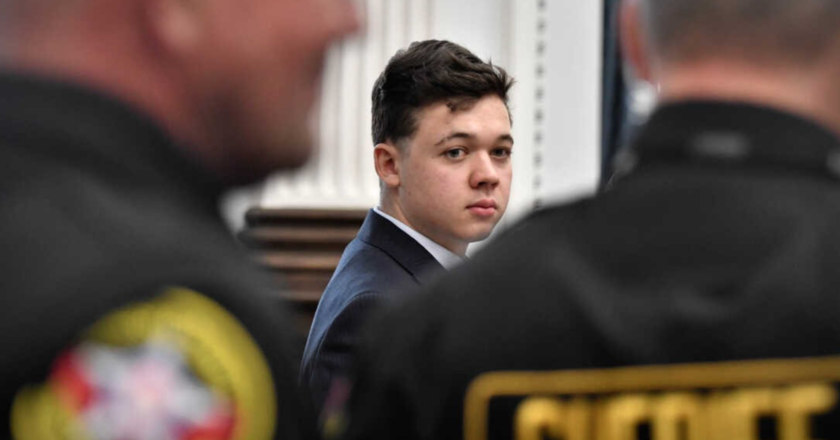On a feverish August evening, 17-year-old Kyle Rittenhouse equipped himself with an AR-15 rifle at a Black Lives Matter protest in Kenosha, Wisconsin, after the recent shooting of Jacob Blake, a 29-year old black man shot and killed by a police officer.
While it remains unclear how the incident arose, it is clear that two protesters faced fatal gunshot wounds and that one protester was left injured. This tragedy raises the question of whether Rittenhouse planned the shooting or was just trying to protect private property, acting in self-defense.
During the trial Rittenhouse claimed that he intended to go out as a medic and help protect private property, but he then started to get chased and was threatened by protesters. He also claims that he believed that the protester he shot and killed meant harm towards him.
Undoubtedly, Rittenhouse carried a deadly weapon, and of the three protesters who were shot, one was armed. The survivor of the shooting explains that he accidentally pointed his glock pistol at Rittenhouse. He also testified that he thought he “was going to die,” when coming face to face with Rittenhouse, so the victims of the shooting attempted to disarm Rittenhouse.
After a two-week trial, the jurors acquited all charges against Rittenhouse, including murder. Notwithstanding, the protocol in which the trial was carried out seems unusual. In particular, jurors were chosen unusually quickly, in only one day. The picking of jurors usually takes more than two weeks, sometimes even months. In contrast, the process of choosing jurors for the Ahmuad Arbery case–in which three white men murdered a black man–took three weeks. This trial took place at the same time as the Rittenhouse trial, with the defendants found guilty of murder.
Additionally, the use of certain words was banned from the trial. Judge Schroedor banned the lead prosecutor from using the word “victim,” explaining that it was a “loaded word,” all the while choosing to let the defense use the words “looters” and “rioters” to describe the protesters who were shot and killed.
Judge Schroedor also berated the lead prosecutor during the cross-examination of Rittenhouse and did not let the prosecution present evidence that he ruled inadmissible. All of these nuances during the trial point to the fact that there could have been bias that was not in the favor of the prosecution.
Although the trial ended with Rittenhouse being found innocent, my opinion is that it was Rittenhouse’s fault for what happened, because ultimately he shouldn’t have brought and displayed a loaded AR-15 at a scene that was already intense. This only exacerbated the situation, killing two unarmed men. Since he provoked the situation, it seems invalid to claim self-defense.
The Kyle Rittenhouse shooting and verdict sparked intense debates about gun control, self-defense, and racial injustice.
Since Rittenhouse was allowed to possess and freely carry a loaded AR-15 rifle and was also not charged on the account of illegal possession of a gun, the verdict was a loss for gun control advocates, who argue that possessing guns are dangerous and incite shootings. This also shows that the jury did not think that his possession of the gun caused that night’s violence. Despite this, the fact is that if there was more gun control, the shooting would have never happened.
On the side of self-defense, the verdict presents an equally intense discussion. The whole case for the defense was that Rittenhouse acted in self-defense. The prosecution was not able to beat this argument and as a result the jury took the side of the defense, claiming that Rittenhouse was defending his life.
Lastly, the centuries-long debate of racial injustice is highlighted by this verdict. The jury for the trial was all white except for one person of color, and many could argue that this was biased toward Rittenhouse, a white man at a Black Lives Matter protest. The place and manner of the shooting, at a Black Lives Matter protest, also presents a racial controversy.
After the shooting, police allowed Rittenhouse to freely walk away from the scene, with a gun fully displayed and people shouting that he had just shot someone. Would this have been the case if Rittenhouse was a black man? Thus, it is clear why this case is so relevant to hot political topics, such as gun control, American justice, and race.
Sources:
https://www.npr.org/2021/11/19/1057288807/kyle-rittenhouse-acquitted-all-charges-verdict
https://abcnews.go.com/US/long-strange-trip-kyle-rittenhouses-trial/story?id=81252646
https://www.cnn.com/2021/11/01/us/kyle-rittenhouse-shooting-victims-trial/index.html
https://www.nytimes.com/2021/11/20/us/kyle-rittenhouse-gun-control.html
https://www.theatlantic.com/ideas/archive/2021/11/rittenhouse-trial-verdict-not-guilty/620737/ https://www.firstpost.com/world/kyle-rittenhouse-who-is-he-and-why-is-his-trial-significant-for-america-10144971.html

